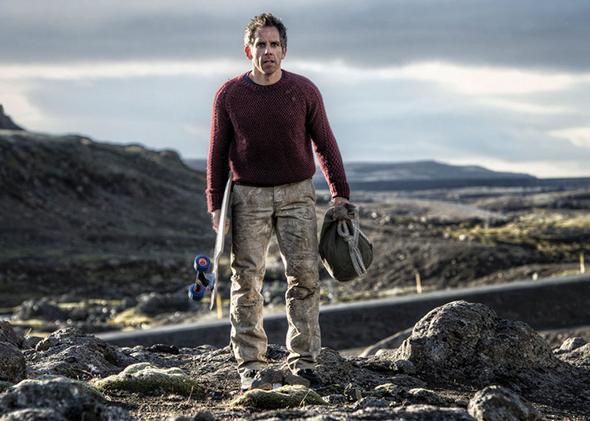I commend Ben Stiller for trying something in The Secret Life of Walter Mitty—an adaptation of the 1939 James Thurber story, written by Steve Conrad and directed by and starring Stiller as the daydreaming office worker of the title—that few American comic directors would attempt. He chooses to frame Thurber’s story not as a raucous action comedy (or, like the 1947 adaptation starring Danny Kaye, as a lighthearted romantic musical) but as a mournful, possibly mystical voyage of self-discovery—put it this way, there is a literal trip up a Himalayan mountain in search of a wise man—without giving up hope of making the audience laugh. Neither the spiritual insights nor the jokes always hit the mark, and sometimes one cancels out the other, giving the film a curiously neutral, blank quality. But Stiller’s attempt to braid together introspection and humor kept me engaged and curious, even when I wasn’t quite sure what he was setting out to do.
This Walter Mitty feels like a creation that’s taken too long to fight its way out of its creator’s brain (and indeed Stiller and others have been trying, with quixotic dedication, to get the film made for almost two decades). Maybe this long incubation period accounts for the movie’s strange out-of-time quality: Though it’s apparently set in the present day, the film chronicles the folding of Life magazine as a print publication, an event that happened more than a decade ago. Stiller’s Walter is a Life photo archivist—or, in his dull description of his own job, a “negative assets manager”—who’s anxious about being downsized as the magazine moves to an all-online format. His new boss, the callow Ted Hendricks (an officious and luxuriantly bearded Adam Scott) is scarcely able to fake caring as he announces the impending firings to the magazine’s staff. Walter’s own job seems safe—he’s been at the company 16 years, after all—until he misplaces a negative from the legendary photographer Sean O’Connell (Sean Penn) that was intended for Life’s final cover.
With his boss breathing down his neck for the photo, Walter resolves to track down the elusive O’Connell, who’s so old-school he communicates with the magazine by telegram. In his quest for the grizzled photog, Walter will travel to Greenland, Iceland, and finally Afghanistan. His real-life escapades (which include fighting off a shark, fleeing an erupting volcano, and taking a helicopter ride with a dead-drunk pilot) are frequently augmented by elaborate fantasy sequences in which Walter briefly becomes a champion of the oppressed, an invincible action hero, or a smoldering Latin lover.
As Cheryl Melhoff, the Life co-worker on whom Walter harbors an entirely secret crush (and who helps him in his search for the mysterious missing negative), Kristen Wiig gives an understated but appealing performance that suits the movie’s muted mood. But in too many scenes—especially those involving Walter’s private revelations over the course of his various road trips—muted slides into muffled. As actors directing themselves will tend to do, Stiller leaves the camera on his reflective face for long periods as he ponders, for example, getting on that copter with the drunk pilot (a choice that the movie frames, somewhat oddly, as an act of spiritual courage) or skateboarding at top speed down a deserted Icelandic highway. We pick up from contextual cues (and from the staggeringly gorgeous landscapes that surround him) that these must be the moments in which Walter is learning to truly experience life—something that, despite his long employment at a magazine by that name, he clearly knows next to nothing about. But the character’s spiritual trajectory remains vague, maybe because Walter himself is something of a nullity, a conceit more than a character. When he finally meets up with the gnomic O’Connell for some mountaintop philosophizing, there’s not really a sense that Walter, well-traveled as he may now be, is bringing any hard-won wisdom to the table—it’s just Sean Penn doing a lot of Pennsplaining.
Despite its occasional forays into an almost New Age spirituality (and at least three too many travel montages scored to soaring indie rock), there’s a gentleness to The Secret Life of Walter Mitty that I appreciated. You see it in the scenes between Stiller’s character and his mother, played by Shirley MacLaine with a sensitivity that points up the burlesquey broadness with which mothers are usually depicted in the bro-dude-grows-up school of film comedy. Walter Mitty is about a not-so-bro-dude who needs to grow down, a long-constricted adult trying to rediscover some of his lost childhood passions (for skateboarding, for travel, for imagining himself as a part of a bigger life). But the note of sentimental uplift the film ends on doesn’t feel entirely earned, maybe because the pensive, diffident Secret of Walter Mitty never quite gives the audience the gifts it eventually bestows on its hero—a renewed sense of playfulness, possibility, and fun.
